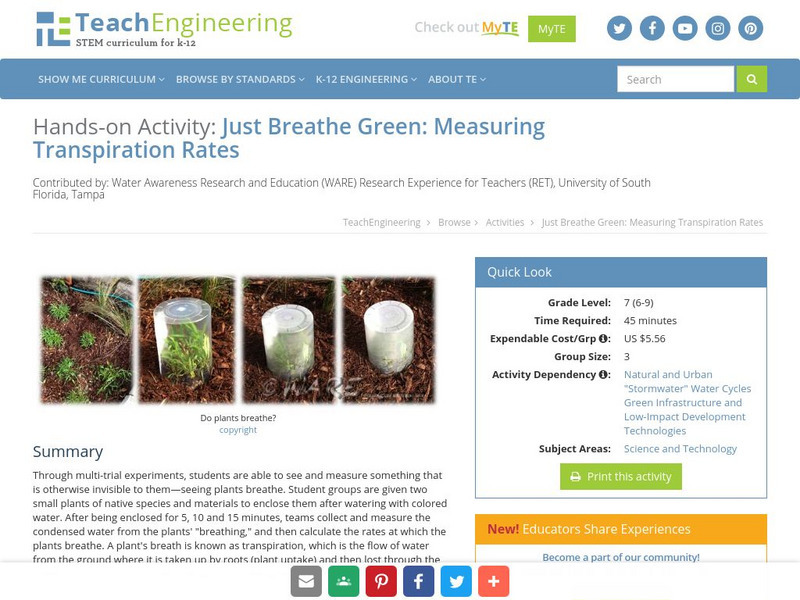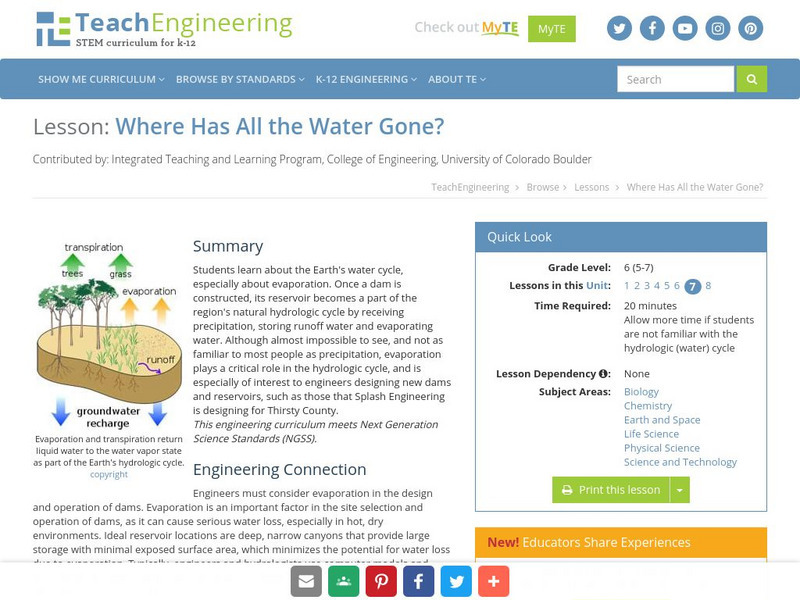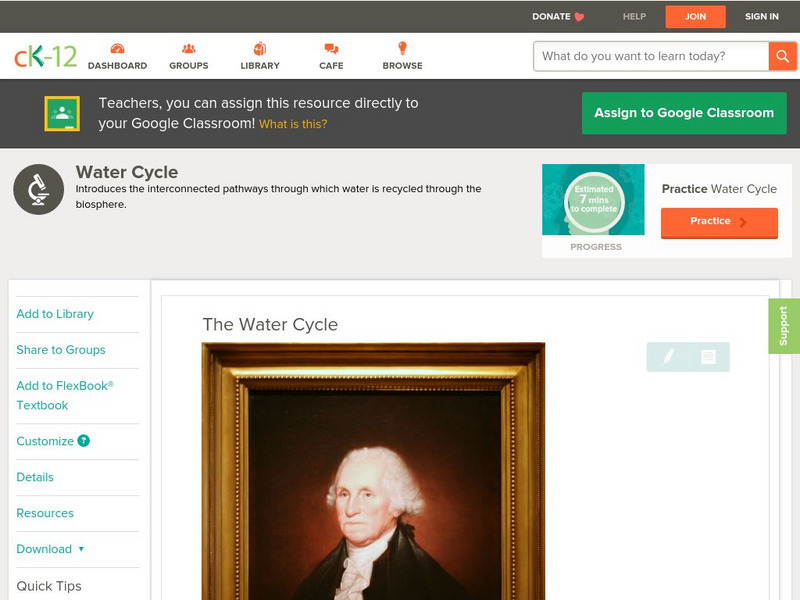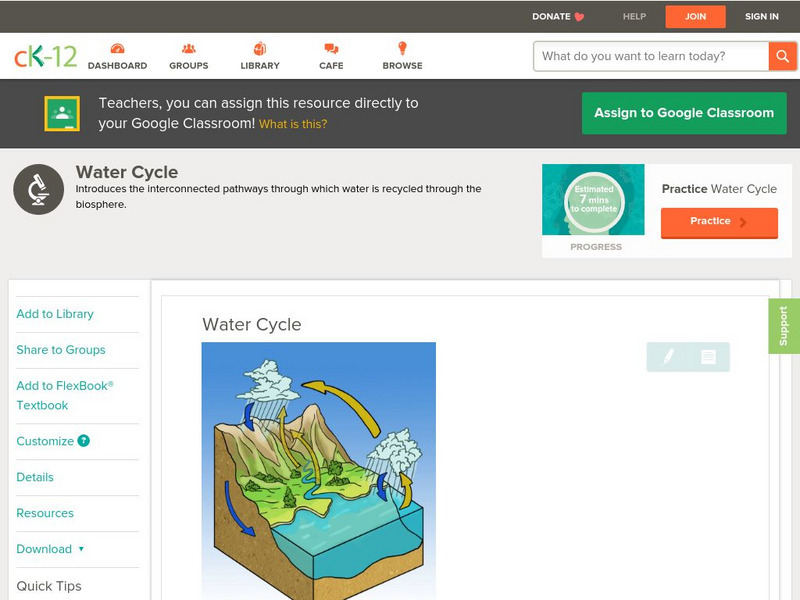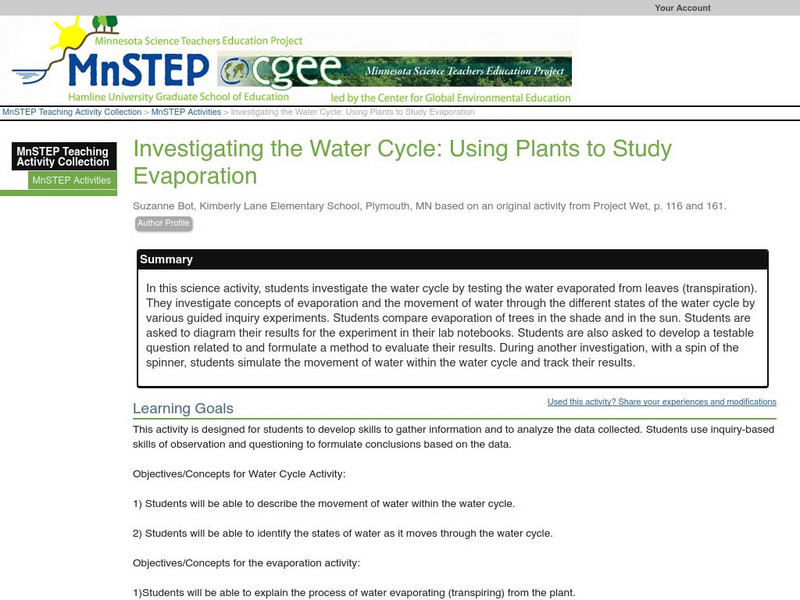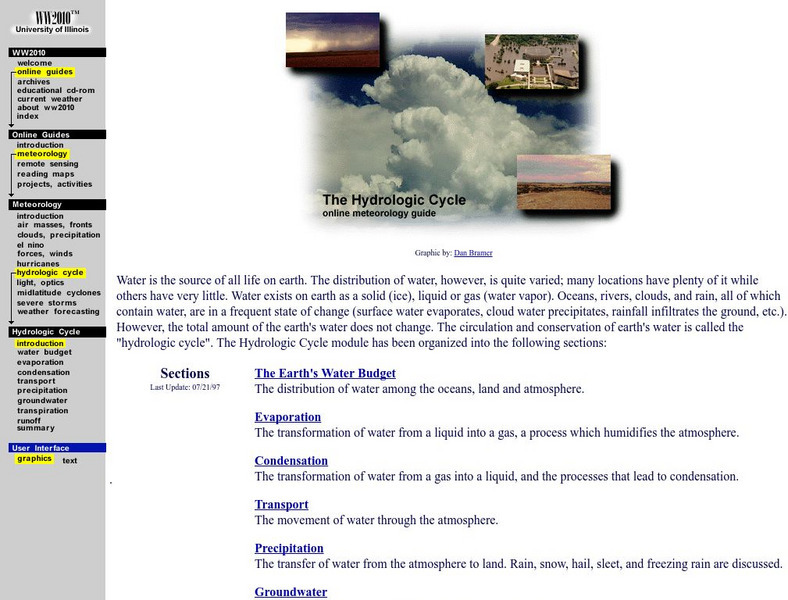TeachEngineering
Teach Engineering: Just Breathe Green: Measuring Transpiration Rates
Through multi-trial experiments, students are able to see and measure something that is otherwise invisible to them- seeing plants transpire. This information will allow students to consider how a plant's unique characteristics (leaf...
TeachEngineering
Teach Engineering: Natural and Urban "Stormwater" Water Cycle Models
Students apply their understanding of the natural water cycle and the urban stormwater water cycle, as well as the processes involved in both cycles to hypothesize how the flow of water is affected by altering precipitation.
TeachEngineering
Teach Engineering: Where Has All the Water Gone?
Students learn about the Earth's water cycle, especially about evaporation. Once a dam is constructed, its reservoir becomes a part of the region's natural hydrologic cycle by receiving precipitation, storing runoff water and evaporating...
CK-12 Foundation
Ck 12: Earth Science: Processes of the Water Cycle
Understand the water cycle.[Free Registration/Login may be required to access all resource tools.]
CK-12 Foundation
Ck 12: Life Science: Water Cycle
[Free Registration/Login may be required to access all resource tools.] Water and elements like carbon and nitrogen are constantly being recycled through the environment. This process is called a biogeochemical cycle because it involves...
Scholastic
Scholastic: Study Jams! Science: Weather and Climate: Water Cycle
Water water everywhere. Check out this video clip and test understanding about the cycle of water from the earth to the atmosphere.
CK-12 Foundation
Ck 12: Earth Science: Processes of the Water Cycle
[Free Registration/Login may be required to access all resource tools.] Describes the water cycle.
CK-12 Foundation
Ck 12: Biology: Water Cycle
[Free Registration/Login may be required to access all resource tools.] Covers the water cycle.
University of Victoria (Canada)
Weather Watch: Water Cycle
Excellent discussion and illustration of the water cycle.
University of Victoria (Canada)
Weather Watch: Water Cycle
Excellent discussion and illustration of the water cycle. Explained in an easy to understand format.
Science Education Resource Center at Carleton College
Serc: Rain Erosion: Does the Rate of Water Effect Erosion?
In this lab, students investigate whether the rate of water falling (rain) affects the amount of erosion (soil movement). This experiment could lead to further questions: how does grass or rocks effect soil erosion, does erosion lead to...
Science Education Resource Center at Carleton College
Serc: Investigating the Water Cycle: Using Plants to Study Evaporation
In this science activity, students investigate the water cycle by testing the water evaporated from leaves (transpiration). They investigate concepts of evaporation and the movement of water through the different states of the water...
Missouri Botanical Garden
Missouri Botanical Garden: The Water Cycle
This simple overview provides definitions of key terms in the water cycle and a diagram showing the path water takes in this cycle.
ClassFlow
Class Flow: Water Cycle
[Free Registration/Login Required] This is a science flipchart that reviews the stages of the water cycle and also ways in which the water cycle affects weather such as hurricanes and tornadoes.
University of Illinois
University of Illinois Urbana Champaign: The Hydrologic Cycle
Water is the source of life on earth. It exists in many forms and is constantly changing. The circulation and conservation of earth's water is called the hydrologic (or water) cycle. Find out how water evaporates, condensates,...
TeachEngineering
Teach Engineering: Witnessing Evaporation
The engineers at Splash Engineering (the students) have been commissioned by Thirsty County to conduct a study of evaporation and transpiration in their region. During one week, students observe and measure (by weight) the ongoing...
TeachEngineering
Teach Engineering: Life Science
This unit covers the processes of photosynthesis, extinction, biomimicry and bioremediation. In the first lesson on photosynthesis, students learn how engineers use the natural process of photosynthesis as an exemplary model of a complex...
Biology Pages
Kimball's Biology Pages: Transportation in Plants
A very good explanation of the processes of water transport in plants. Includes graphics that accompany this very detailed explanation.
Museum of Science
Museum of Science and Industry: Online Science: Color Changing Carnations
A popular plant experiment where food coloring is added to the water that flowers sit in, to see how this affects the color of the flowers. It demonstrates how water travels through the xylem of a flower stem.
TeachEngineering
Teach Engineering: Biodomes
Students explore the biosphere's environments and ecosystems, learning along the way about the plants, animals, resources and natural cycles of our planet. Over the course of lessons 2-6, students use their growing understanding of...
TeachEngineering
Teach Engineering: Photosynthesis Life's Primary Energy Source
This lesson covers the process of photosynthesis and the related plant cell functions of transpiration and cellular respiration. Young scholars will learn how engineers can use the natural process of photosynthesis as an exemplary model...
